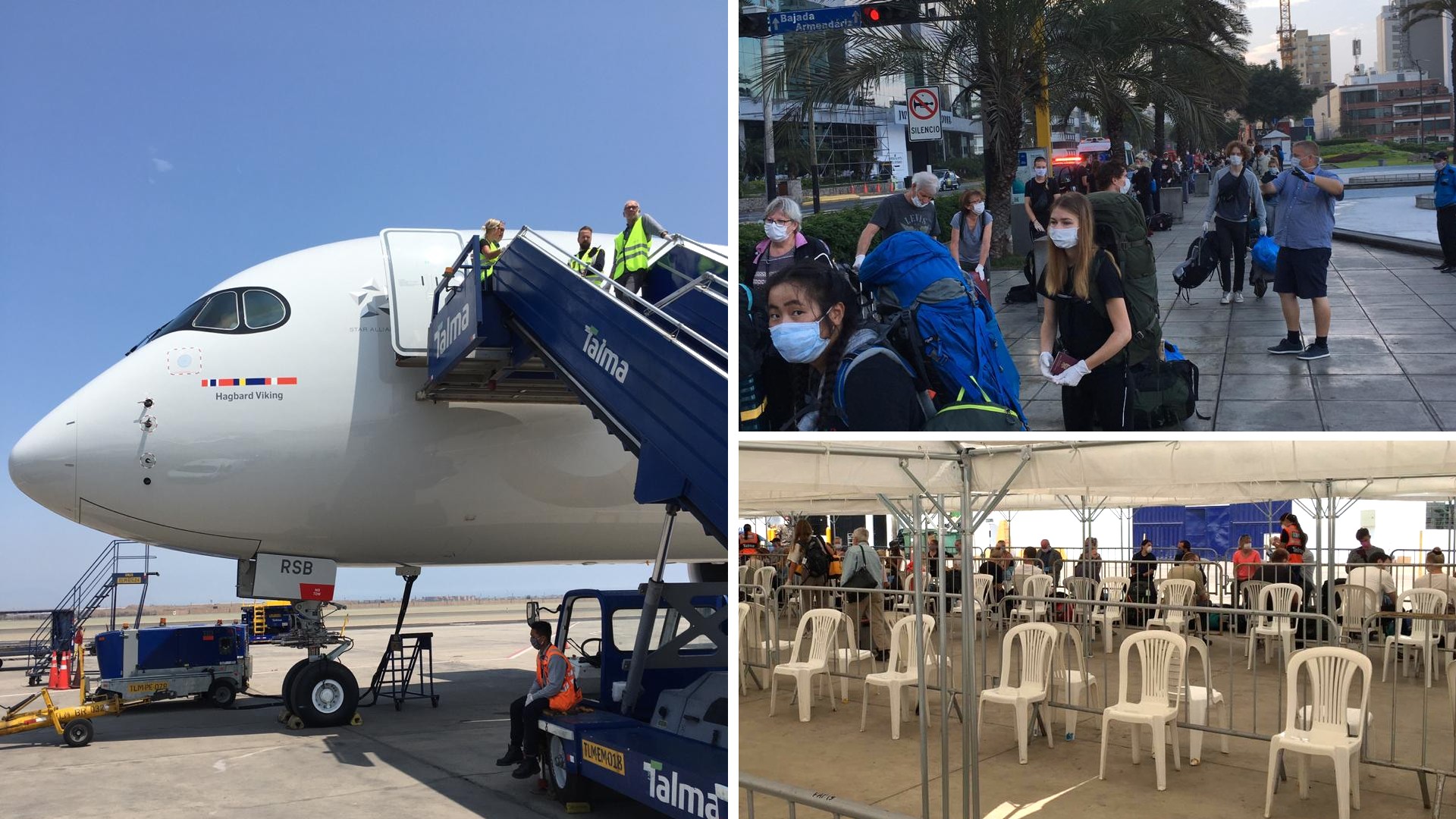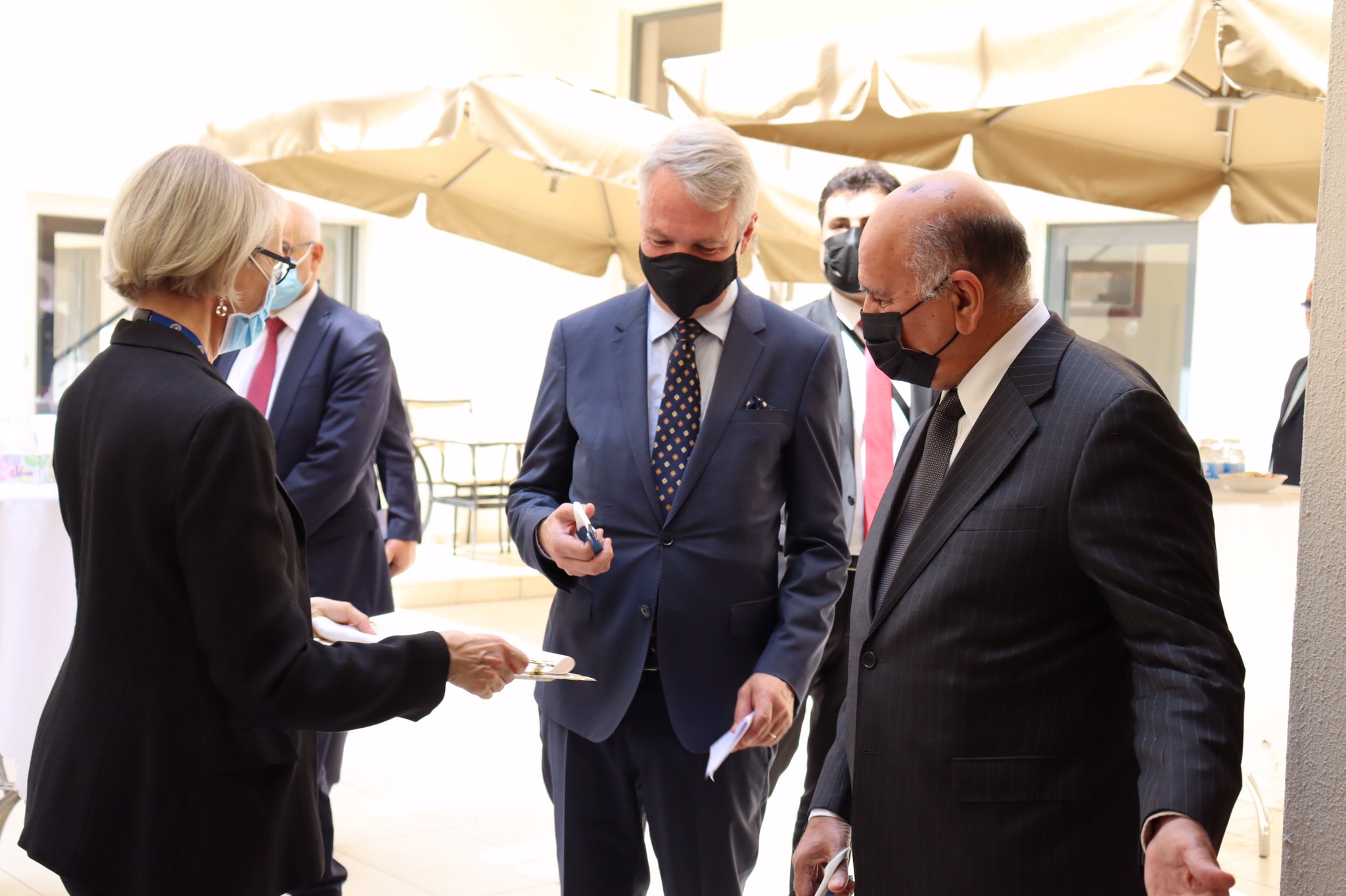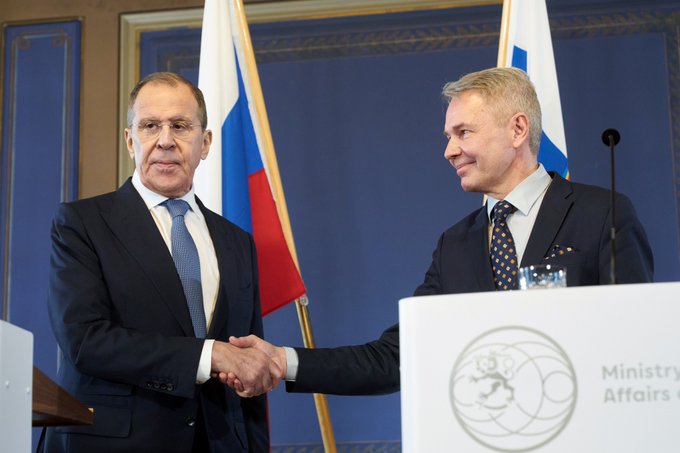Minister for Foreign Affairs Pekka Haavisto: Foreign Policy Year 2020
Much has been written and said about how exceptional the year 2020 turned out to be. The Covid-19 crisis affected the whole world in a way that stopped us all for a moment.
Philosopher Hannah Arendt has reflected how the new always happens against the odds of statistical laws and probabilities known to us. The pandemic turned our world upside down, but it also forced societies around the world to quickly come up with new ways of working and coping. As Arendt writes in The Human Condition: “The fact that man is capable of action means that the unexpected can be expected from him, that he is able to perform what is infinitely improbable.”
The first images of the pandemic were bleak: Full morgues in Italy, bodies burned on the streets of Guayaquil in Ecuador, elderly residents in care homes without carers.
At first, it may have seemed that states were turning inwards, as decision-makers urgently considered how to stop the pandemic in their own countries. This was also the case in the EU. However, it soon became clear that foreign policy and international cooperation have a truly vital role to play at times such as these.
Making digital transformation and remote working a reality
Finland has been proud of its good data connections and the ability of its citizens to access digital services. The Covid-19 crisis put this ability into a real test. Distance learning and remote working did not happen by a click of the fingers. They demanded a great deal of us and brought many things into sharp focus, above all the breadth of teachers’ professional skills in Finland.
The Ministry for Foreign Affairs also took a giant leap towards digital diplomacy, keeping the lines of communication open. We have organised nearly 200 telephone calls, including videoconferencing, for ministers and leaders of international organisations.
The Ministry for Foreign Affairs adopted new working methods: while ensuring that the safe distances and periods of self-isolation required by the pandemic were maintained, management groups and weekly meetings of department heads switched over to the digital age. The Government and the ministerial committees also embraced remote working.

Just as in other workplaces, the Covid-19 crisis did not stop the work in the Ministry for Foreign Affairs. Instead, we learned new ways of working. All efforts were made in Helsinki and in the missions abroad to keep the wheels turning and the services available.
Arranging repatriation flights and family reunification
Since the beginning of the crisis, the staff of the Foreign Ministry’s consular services and numerous missions abroad have been in the front line, solving the problems caused by the pandemic for Finnish citizens and their families around the world. They deserve special thanks for helping thousands of Finns to return home in the early stages of the pandemic after the borders closed and most flights were cancelled.

Thanks to the staff at the Ministry for Foreign Affairs, it has been possible to help Finnish people in difficult circumstances throughout this year of crisis – whether to return home, bring family members together or allow the workforce needed by businesses to enter Finland. We actively sought a solution to the issue of agricultural seasonal workers, even when the workers’ countries of origin had to impose their own restrictions on labour mobility due to the coronavirus. Active negotiations on seasonal workers have been held with, for example, Ukraine and Thailand.
Finland has taken the initiative towards other Schengen countries to find a common course of action regarding visa applications for special groups in emergency conditions. So far, we have been met with little response, but we will continue our efforts so that visa applicants seeking to enter Finland, for example because of an established relationship, could submit their applications to the missions of the Schengen countries that represent Finland in countries where we do not have a mission of our own.
Together with other authorities, we are also looking for ways to eliminate the backlog created during the pandemic in the processing of residence permit applications. At the moment, all Finnish missions have been able to open their customer services, but in order to safeguard the health of both customers and staff, only a fraction of the number of customers can be received compared to normal conditions. Local restrictions also cause interruptions and congestion in customer service. We are doing everything we can, but many things are not in our own hands in a global pandemic.
At the time of writing this, Traficom has just announced a two-week suspension in passenger traffic between Finland and the United Kingdom for reasons related to the pandemic.
I know that many couples and families had to spend this Christmas in different countries due to the difficulty of traveling and obtaining the necessary documents. We will do everything we can to find solutions to these questions.
Adding remote diplomacy to the foreign policy toolbox
In the past year, diplomatic relations were increasingly supported by the use remote applications. Ministers and ministries quickly incorporated video and online meeting systems into their daily work. Closer telephone diplomacy also enabled a more active exchange of messages between ministerial colleagues.
For example, as the events were unfolding last spring, I exchanged ideas almost daily with my ministerial colleagues in Estonia and Sweden. This easy handling of meetings through remote connections will certainly remain part of the everyday tools of foreign policy in the coming years. It will help us reduce the amount of extra travel, allowing us to organise physical meetings less frequently and more selectively. And our climate will also thank us for it.
During the year, video conferences were balanced by more traditional meetings. The visits to Iraq and Afghanistan were important for Finland’s foreign policy profile. Finland has made great efforts in both countries in terms of crisis management, and our expertise is recognised there. But developing strong political relations also remains an important objective.

Finland is well-known for being able to organise high-level international meetings safely and confidentially. This year, our country also became an attractive destination for the reasons of safety during the Covid-19 crisis. The New Start disarmament talks between Russia and the United States were held in Helsinki in autumn 2020. During the year, the Russian Foreign Minister Lavrov visited Finland, and telephone discussions were held with the US Secretary of State Pompeo.

In the early autumn of 2020, foreign policy debate in Europe was dominated by news about the situation in Belarus. This debate was at the heart of not only the informal Gymnich meeting of foreign ministers in Berlin, but also the visit to Vilnius, where it was also possible to meet representatives of the Belarusian opposition.
Bringing climate policy and humanitarian issues into focus
In these exceptional circumstances, international cooperation has shown its strength. The European Union agreed on a historic recovery package to help get the common economic area back on its feet. A key objective of the package is green recovery – the aim of making Europe a more environmentally sustainable continent.
In December 2020, the European Council agreed on a new, stricter emission reduction target for the EU. The Union is committed to reducing its emissions by at least 55 per cent by 2030 from the 1990 levels. The previous emission reduction target was 40 per cent. This objective is a new milestone in the EU’s journey to becoming carbon neutral by 2050.
In the middle of the Covid-19 crisis, the position of the World Health Organisation (WHO) became more difficult as the United States withdrew its funding. However, the information produced by the WHO with other international and national experts was valuable in the midst of the crisis, and the WHO is also needed in making vaccines available worldwide.
Finland was able to channel more support both to the WHO and to humanitarian actors at a time when the international rules-based system was being eroded from the inside. According to the United Nations, the need for international humanitarian assistance will reach a record high in 2021: more than 230 million people will be dependent on assistance. Finland increased its humanitarian assistance by 46 per cent this year.

In 2020, together with the UN and the Afghan Government, we co-hosted the pledging conference for Afghanistan, with a successful outcome. The Finnish Minister for Development Cooperation and Foreign Trade Ville Skinnari and the Minister for Foreign Affairs were both present at the meeting held in Geneva. Remote connections made it possible for 70 countries and more than 30 organisations to participate in the meeting. We succeeded in achieving both a political declaration and a four-year framework in which aid will be conditional upon matters such as human rights and the strengthening of the position of women in Afghanistan. USD 12 billion was pledged for the next four years. Ambassador Janne Taalas and his team did a great job in preparing the Afghanistan Conference.
EU foreign ministers held remote meetings or convened in Brussels, Luxembourg and Berlin. Remote working became easier with every meeting; microphones were no longer left open by accident and the lines were finally working.
Strengthening mediation and women’s participation
In the Government Programme, we are committed to the active promotion of peace and human rights. This year, we strengthened the mediation expertise of the Ministry for Foreign Affairs by establishing a new Centre for Mediation under the Political Department. The Centre’s aim is to strengthen Finland’s reputation in the field of mediation and to build up the related knowledge and skills base at the Ministry for Foreign Affairs. The Centre’s mission is to promote Finnish expertise in mediation and dialogue processes, and to develop the structures surrounding mediation, in addition to financing peace processes.
One of our objectives is to increase women’s participation and empowerment in peace processes. This year, too, we have made some progress in this area. Women make up 42 per cent of our civilian crisis management experts. We have also made strong efforts to advocate women’s promotion to key leadership positions. This year, Anne Meskanen, an experienced Finnish diplomat, was appointed to the position of Deputy Head of Mission of the European Union Advisory Mission (EUAM) Iraq. This autumn, we joined the European Centre of Excellence for Civilian Crisis Management, which Germany set up during its Presidency of the Council of the European Union. From the outset, the Centre has placed a strong emphasis on women’s participation in crisis management. Finland was one of the first countries to have seconded a national expert to the Centre.
Promoting equality is a fundamental objective for Prime Minister Sanna Marin’s Government in all administrative branches. The Government’s Action Plan for Gender Equality, adopted this year, includes an important section on promoting gender equality in international contexts. The Ministry for Foreign Affairs is involved in its implementation. The report on gender equality policy, extending across parliamentary terms, is being prepared and will also address our international gender equality objectives.
About the Government Report on Foreign and Security Policy and the Africa Strategy
In the autumn, the Government adopted the new Report on Finnish Foreign and Security Policy, in which human rights and climate issues go hand in hand with traditional security concerns. According to the Report, foreign and security policy is based on human rights, which means assessing the impact on human rights of all foreign and security policy activities.
The Report contains a realistic description of the changes in the international operating environment that also affect the security of Finland and the Finnish people. The Report reinforces the Government Programme’s objectives of supporting the rules-based international system and of responding to major global challenges, such as climate change, with ambitious measures. For a small country such as Finland, value-based foreign policy is a practical choice which also helps us defend our own interests.
The reporting and strategy processes for which the Ministry for Foreign Affairs is responsible have been prepared in an inclusive manner and in consultation with various stakeholders. These consultations have been carried out purposefully in the early stages of the processes, so that the consultations would have a genuine role in the preparation of policies. During the drawing up of the Report on Finnish Foreign and Security Policy, open seminars were held in cooperation with universities around Finland, from Helsinki to Rovaniemi. Many people from different sectors also participated in the consultations on the Africa Strategy and the Human Rights Report.
These discussions with experts from different fields and with interested citizens have been enlightening and given rise to new ideas and connections. They have shown that the more ambitious we wish to be in advancing our causes, the more strength we must gather and the more we must cooperate.
Towards 2021
The Covid-19 pandemic will have an impact on international politics and inter-country relations for some time to come. The EU has sought to safeguard its economic capacity through stimulus measures and a stronger focus on a green and sustainable economy. At the same time, we can see how competition is intensifying in areas such as the development of digital technology. This situation is also reflected in the new 5G legislation, to the preparation of which the Ministry for Foreign Affairs had contributed and which was submitted to Parliament in 2020.
In security policy, many types of hybrid and cyber threats have emerged alongside traditional threats. But it is also true that these threats have caused more voices in the international community to call for a treaty-based world order – which is also a great advantage for a small country.
We are living through times of transition – but during times such as these Finland can make use of its strengths: our education system, high technology, environmental excellence, approach to gender equality, respect for the rule of law, and experience of mediation. And we can also rely on these strengths in 2021. The coming year will mark the culmination of our bid to become a member of the UN Human Rights Council, a campaign which we will continue to pursue together.
I would like to thank all staff at the Ministry for Foreign Affairs and at the other ministries, and our many partners, for the past year. I look forward to working with you again in the coming year.
Pekka Haavisto, Minister for Foreign Affairs
